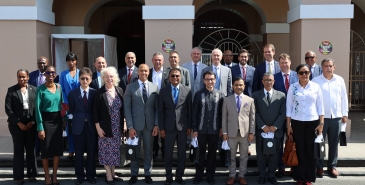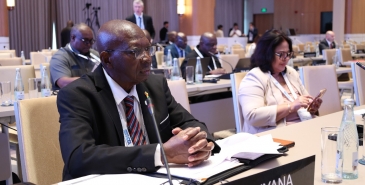National Assets
Speech delivered at: 21st Sitting- Tenth Parliament - 13 June, 2012
13 June, 2012
4943
Dr. Roopnarine: Thank you Mr. Speaker. I must say listening to the Hon. Prime Minister in relation to his warm support for the idea of the financial autonomy of the Commissions that the Hon. Member would have been much more convincing had he come to the House today with a small constitutional amendment indicating that we should insert these Commissions on the Third Schedule. That would have been a simple enough thing to would have been done and, in such a case, we would not have needed to have such a long and tiresome debate.
The fact of the matter is that as things presently stand, we believe that the autonomy and independence of these Commissions is intended by the Constitution. I do not want to take up a whole lot of the time of this Hon. House to belabour this point, but the Constitution of the Co-operative Republic of Guyana is very strong on this; it is very strong on the independence and autonomy of the Commissions. I am happy to see that my friend, the Hon. Attorney General, has a copy of Professor James’ book sitting on his desk and I want to refer us to chapter 9 where he talks specifically about the constitutional office holders institutions. And what he says is:
“These bodies and institutions established or provided for in the Constitution...
This is paragraph one, Mr. Attorney General.
“...that were assigned constitutional duties and functions but are not instrumentalities of the Executive or the Legislature...”
He goes on to talk about the concept. He said:
“The concept embraces those persons, institutions and offices that are subject to the constitutional requirement expressed in various forms, that they are to remain free from outside control or direction and are functionally independent of both Executive and Parliament.”
Professor James goes on to identify four categories of the constitutional office holders. The first category he deals with is those bodies which have investigative power to guard against the abuse of power or mismanagement, and he cites the Ombudsman and the Auditor General in this first category. The second category is what he calls institutions of political neutrality which include the Elections Commission and the Director of Public Prosecutions and the third category which is what concerns us here this afternoon, has to do with the judicial offices, judges and the Service Commissions. And what is he saying? He says:
“The third category, comprising judicial officers, judges and the service commissions, emphasises the need for ensuring the integrity of the processes and services, in particular the avoidance of Executive or other political influence in the execution of their constitutionally assigned functions.”
To ensure this independence and autonomy, there is, of course in our own Constitution and I want to say that the Constitution, I wish to emphasise, is very strong on this principle and that is why we believe that any action that undermines the independence and autonomy or which has the possibility or potential to undermine the independence and autonomy should be corrected or resisted.
The point that he makes, and I want to turn to the Constitution which states explicitly in Article 226 (1) – The Powers and procedure of Commissions:
“Save as otherwise provided in this Constitution, in the exercise of its functions under this Constitution a Commission shall not be subject to the direction or control of any other person or authority.”
It could not be more explicit, and Article 226 goes on, in section (7), to state:
“In this Article, except as otherwise provided or required by the context, the expression “Commission” means the Elections Commission, the Judicial Service Commission, the Public Service Commission, the Teaching Service Commission, or the Police Service Commission...”
As I said, this protection of these Commissions in our Constitution is very strong and there are other ways, for instance, in guaranteeing that the emoluments and pensions of members of the Commission be drawn directly from the Consolidated Fund in Article 213 (4). I wish to refer to Article 212FF to re-emphasise the point about insulating the Commissions from Executive influence. What does Article 212FF (d) tell us? It states:
“...the operating procedures and mechanisms for choosing the members of a commission are such as would minimise the influence of the Executive and maximise public perception of impartiality in the operations of the commission;”
I do not know how much more explicit our Constitution can be. And why is it so important? I mentioned the point which is in Article 213 (4) where it states:
“Any benefit to which this article applies (not being a benefit that is a charge upon some other public funds of Guyana) shall be a charge upon the Consolidated Fund.”
This is to do with emoluments and pensions. And why is it so important to insulate these offices from direction and control of the Executive? It is important because of the powers that the Commissions have. Article 201 (1) talks about the power to make appointments to public offices, to exercise disciplinary control over persons holding or acting in such offices and it repeats it for each of the Commissions. And it is for those reasons that the Constitution seeks to insulate these Commissions from any kind of Executive control or direction.
There are even special restrictions that are placed on constitutional office holders and these restrictions have to do with what Professor James terms special restrictions and I refer the Hon. Attorney General to page 119 of Professor James’ book. He says:
“The notions of autonomy and independence of the constitutional office holder is reflected in provisions which impose special restrictions on his or her holding a public office simultaneously with his or her constitutional office, what the Privy Council is calling a quarantine period, that is making the candidate ineligible for appointment if he or she had served in a public office within three years prior to the proposed appointment and imposing a further three year band on his or her eligibility for a public service appointment after his term on the Commission.”
And he points out:
“This is not uniformly applied in Guyana because there are only two Commissions.”
In terms of the disciplinary procedures also, when one looks at the procedures for the removal of a commissioner, all of which comes under Article 225 (2), again the Constitution goes to great lengths to ensure that when it comes to the disciplining of a member of a commission, there is a very elaborate procedure as we know – the establishment of a tribunal, the submission of a report and so on – so that there can be no arbitrariness or capriciousness in the removal of a member of the commission. I am pointing out these things to say how strong the Constitution is on the question of autonomy and independence.
On the question of funding, which is where we are, I refer you to page 123 of Professor James’ book. What does he say here?
“The overreliance of these offices on the Executive for financial resources is thought to be one of the main stumbling blocks to their effectiveness. The concept of a constitutional office implies adequate funding in order to carry out constitutional functions.”
And one might extend Chief Justice Hietaly’s warnings about dependent judiciary to these institutions. There is a need, therefore, to enforce the constitutional requirements on funding and such like. I think it is for that kind of reason that, for instance, the Constitution of India, in Article 322 states:
“The expenses of the Union or a State Public Service Commission, including any salaries, allowances and pensions payable to or in respect of the members or staff of the Commission, shall be charged on the Consolidated Fund of India or, as the case may be, the Consolidated Fund of the State.”
My own view is that the Constitution Reform Commission of 1999 took a giant step forward in establishing the parliamentary instrument that was designed to put distance between the Executive and the Service Commissions and that is why we have the very salutary Article 119 C which sets out the manner in which members of commissions are to be appointed. Article 119 C states:
“There shall be a standing committee of the National Assembly which shall have responsibility for initiating or otherwise taking such action or addressing such matters as may be entrusted to the Committee by the National Assembly in respect of functions required to be discharged by the Assembly under the Constitution in relation to the appointment of a member of a Commission established under the Constitution.”
This Article 119 C, as I said, I believe, is a very far-seeing recommendation that found its way into the Constitution because what it sought to do was to, again, enhance the autonomy and independence, and this was repeated in Article 198 (2) (b) which sets out, in effect, the manner in which the Commissions will be appointed by the appointive committee.
Hon. Members, what we see, as I said, in the Constitution is a very systematic set of provisions that seeks to insulate the Commissions from any kind of Executive direction or control. And my question simply is this: why after all of these carefully crafted provisions designed to ensure the autonomy and independence of the Service Commissions is all this care and precaution swept away by reducing them to budget agencies? It is, I believe, to turn giants into dwarfs, a trick worthy of Mandrake the Magician. This is what we are dealing with. I believe that the motion that urges the removal from the schedule of the FMA, I urge that we support the motion so that we can return these Commissions to their rightful place as towering pillars upholding the edifice of the democracy.
I do believe that we have no great difficulty should the Hon. Prime Minister feel so moved to bring a constitutional amendment to this House. Should he bring this constitutional amendment, please do not send us to any select committees. Bring the constitutional amendment and I can assure you of the full support of this side of the House to ensure that the Service Commissions remain as the Constitution intended, insulated from Executive control and direction.
Mr. Speaker, thank you. [Applause]
Speech delivered by:
What's New

16 April, 2025
Speaker of the National Assembly Hosts Luncheon and Tour of Public Buildings for Diplomats

08 April, 2025
Minister Kwame McCoy promotes Low Carbon Development Strategy in IPU Committee Meeting on Sustainable Development

07 April, 2025
Speaker Nadir Emphasises Guyana’s Commitment to Social Development at IPU General Debate

07 April, 2025
Clerk of the National Assembly Attends ASGP Plenary Meetings during the 150th IPU Assembly in Tashkent, Uzbekistan

